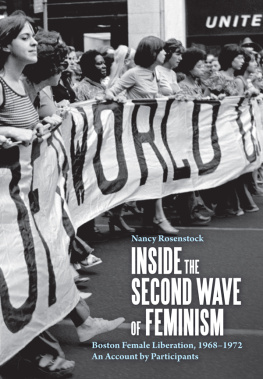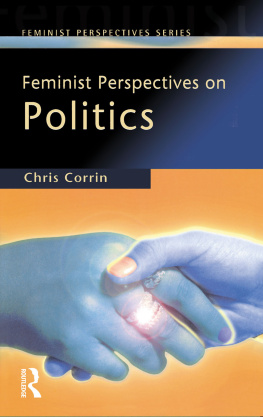Liberation in Print

SERIES EDITORS
Claire Potter, Wesleyan University
Renee Romano, Oberlin College
ADVISORY BOARD
Mary Dudziak, University of Southern California
Devin Fergus, Hunter College, City University of New York
David Greenberg, Rutgers University
Shane Hamilton, University of Georgia
Jennifer Mittelstadt, Rutgers University
Stephen Pitti, Yale University
Robert Self, Brown University
Siva Vaidhyanathan, University of Virginia
Judy Wu, University of California, Irvine
Liberation in Print
FEMINIST PERIODICALS AND SOCIAL MOVEMENT IDENTITY
Agatha Beins

Chapter 4 appeared previously in somewhat different form as Sisterly Solidarity: Politics and Rhetoric of the Direct Address in U.S. Feminism in the 1970s, in Women: A Cultural Review 21 (3) (2010): 293308. Chapter 5 appeared previously in somewhat different form as Radical Others: Women of Color and Revolutionary Feminism, in Feminist Studies 41 (1) (2015): 15083.
2017 by the University of Georgia Press
Athens, Georgia 30602
www.ugapress.org
All rights reserved
Set in 10/13 Kepler Std by Graphic Composition, Inc.
Most University of Georgia Press titles are available from popular e-book vendors.
Printed digitally
Library of Congress Cataloging-in-Publication Data
Names: Beins, Agatha, 1976 author.
Title: Liberation in print : feminist periodicals and social movement identity / Agatha Beins.
Description: Athens : University of Georgia Press, [2017] | Series: Since 1970: Histories of contemporary America | Includes bibliographical references and index.
Identifiers: LCCN 2016055426 | ISBN 9780820349510 (hardback : alk. paper) | ISBN 9780820349534 (pbk. : alk. paper) | ISBN 9780820349527 (ebook)
Subjects: LCSH: FeminismUnited StatesHistory20th century. | Feminism and mass mediaUnited StatesHistory20th century. | FeminismPress coverageUnited StatesHistory20th century. | Womens rightsPress coverageUnited StatesHistory20th century. | Womens mass mediaUnited StatesHistory20th century.
Classification: LCC HQ1421 .B445 2017 | DDC 305.420973/0904dc23 LC record available at https://lccn.loc.gov/2016055426
CONTENTS
ILLUSTRATIONS
ACKNOWLEDGMENTS
It began with a moment I cant precisely remember, but I know that it happened: a friend gave me a zine that her friend had given her. It began with a family that filled our living spaces with books. It began when a teacher encouraged me to write. It began in 1968 with the first issue of Voice of the Womens Liberation Movement. It began with the abolitionist newspaper The Liberator and with Emma Goldmans Mother Earth. It began with a mimeograph machine.
More moments and more people than I can list, remember, count, or even know have carved the path of this book. I wish I had written down the names of all the archivists, student workers, volunteers, and other staff at the libraries and archives I visited. And I wish I could recognize all the people who chronicled 1970s feminism because they mimeographed a page of a newsletter, wrote an article, glued address labels on newspapers for bulk mailing, or supported a periodical with their subscription. How grateful I am as well for those activists who decided to hold onto a piece of paper, a folder, or boxes of ephemera that eventually ended up in an archive. Your imprints texture, strengthen, and haunt this book. It exists because of you.
It is thus with great joy that I can trace a map that locates some of the people and places that enriched this story of U.S. feminism and have allowed me to tell it. First, without the materials of feminisms histories, I could not have pursued the project. In addition to the Lesbian Herstory Archives, where I held my first feminist newspaper from the 1970s, I spent time at the Arthur and Elizabeth Schlesinger Library on the History of Women in America at Radcliffe; the Du Bois Library archives at the University of Massachusetts, Amherst; the Chicano Studies Research Center at UCLA; the University Archives at California State University, Long Beach; the Iowa Womens Archives at the University of Iowa; the Nadine Vorhoff Library and Newcomb College Institute at Tulane University; the Northeastern University Archives; the Southern California Library in Los Angeles; the Sophia Smith Collection at Smith College; the Sallie Bingham Center for Womens History and Culture at Duke University; the Center for the Study of Political Graphics in Los Angeles; the Joseph P. Healey Library archives at the University of Massachusetts, Boston; the New Orleans Public Library; and the Womans Collection at Texas Womans University. Generous funding from the Sallie Bingham Center, Schlesinger Library, Sophia Smith Collection, Vorhoff Library, State Historical Society of Iowa, Historical Society of California, Texas Womans University, and American Association of University Women granted me the time and money for this research. Fellowships and other support from the Institute for Research on Women at Rutgers, the Rutgers Center for Historical Analysis, and a Schlesinger Library summer seminar, Sequels to the 1960s, allowed me to be part of rich, challenging conversations and to receive feedback that deepened my thinking about U.S. feminist histories.
During my travels and graduate work I had the good fortune to encounter activists, scholars, and scholar-activists who shared their wisdom and memories with me: Joyce Berkman, Marisela Chavez-Garcia, Mary Gehman, Judy Gerson, Sherna Berger Gluck, Mary Hawkesworth, Jill Jack, Karla Miller, Sandy Pickup, Aaron Silander, and Sandra Smith. There are also a few folks in archives and libraries who made me feel especially welcome, including Kimberly Johnson, Kren Mason, Bethany Ross, Desiree Yael Vester, Janet Weaver, and Nanci Young. And Maxine Wolfe, your profound commitment to preserving lesbian lives is a model for the refusal to separate theory and practice and makes the power of the archive palpable.
As editors of the series this book joins, Claire Potter and Renee Romano have guided me so wisely and expertlyand with great patiencethrough revisions and re-revisions and re-re-revisions. Thank you for seeing value in this project. Thank you, as well, to the anonymous outside readers who pushed me to sharpen my ideas with their insightful and thoughtful responses to the manuscript. I also have great appreciation for Mick Gusinde-Duffy for believing in my vision of the manuscript. Beth Snead, John D. Joerschke, and Ellen Goldlust deserve much gratitude for their assistance with all the big and small mechanisms of book production.
Since my first forays into underground publications, I have encountered many brilliant thinkers and mentors. Before I could have imagined this book, Caryl Flinn, Miranda Joseph, and Sandy Soto sharpened my thinking about underground and activist publishing as they worked with me on my masters thesis about zines. Bravely facing the untamed wilderness of early chapter drafts, Harriet Davidson, Joanna Regulska, and Trysh Travis offered invaluable guidance for my dissertation. And I offer deep gratitude to Judy Tzu-Chun Wu, who took seriously the ideas of a novice scholar whom shed barely met, reading and supporting my work like it mattered. And I am a better writer because of the way I learned to treat words with care and wonder while Jonathan Johnson advised me during my master of fine arts in poetry. But, foremost, I am indebted to Nancy Hewitt and Elizabeth Lapovsky Kennedy. Liz brought me into the feminist fold when I was a new and naive masters student at the University of Arizona and shared with me the labors of editing an anthology, a gift for which my gratitude continues to grow. Nancy agreed to serve as my dissertation committee chair when I had only nebulous ideas about feminist periodicals. Even the most superlative thanks only partially convey my gratitude for the way her feedback helped me craft the first version of this book. I so admire the way both of you have modeled accountable scholarship, and I hope to follow in your footsteps.
Next page




